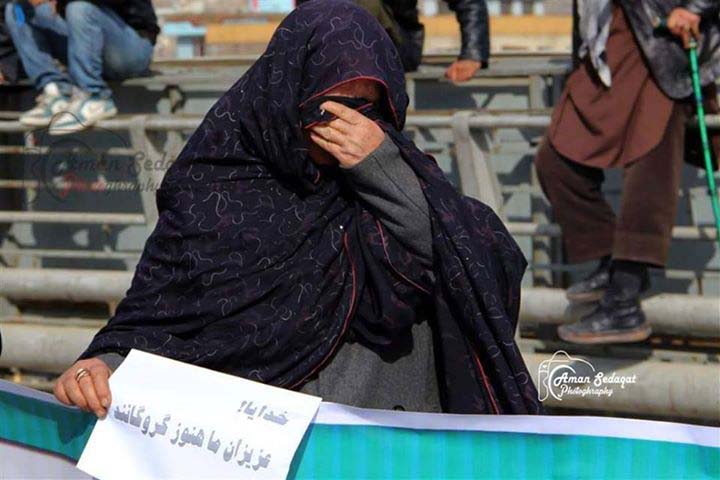It is the for the third time that rumors suggest imminent release of the 31 passengers abducted more than two months ago on Kabul-Kandahar highway in Zabul province. Reports suggest efforts have been underway in recent days in Zabul and Ghazni provinces to arrange swap of Taliban prisoners with the 31 abductees. More than two months ago, the 31 passengers, who were returning home from Iran, were selectively abducted allegedly by Islamic State militants on Kandahar-Kabul Highway. Since then, there have been prolonged protests from the civil society community and the families of the abducted passengers. However, most of the back-channel efforts mediated by tribal elders for the release of the passengers have been in vain.
The government also launched a military offensive in Zabul province aiming to release the hostages. However, the operation ended with no result. In fact the military operation virtually closed for a while the communication channels between the Taliban and the government officials through local elders in Zabul and Ghazni provinces. With each day passing, glimpse of hopes for safe release of the passengers had been vanishing. With the stalemate persisting, local elders and inter-ethnic negotiators seemed helpless expressing exhaustion over the situation. In recent weeks, almost everyone was convinced that there was no hope for saving the abducted passengers. However, there are renewed hopes now for imminent release of the hostages as government officials and local influential figures are mediating for the releases.
The possible release of the abductees is seemingly is becoming true as result of the recent silence – as there were no much media coverage and no military offensive for spoiling the efforts – which provided the opportunity for local and tribal negotiators to continue talks with the militants. In the meantime, the lull also discouraged the Taliban-affiliated militants that their demands for releasing their prisoners from the Afghan government’s prisons would not be met and their conditions would go ignored by the government. Both the government of Afghanistan and the society went the wrong way in seeking safe release of the passengers. The public uproar aimed at pressurizing the government for negotiating with the hostage takers as well as the military offensive somehow was helpful, but it did have considerable negative impacts on the process of secret negotiations with the militants.
Such environments needs involving kidnapping needs restraints to allow back-door negotiations. This has now made the problem even more complicated. The government was not ready to fulfill demands of the militants, in part for fears of future incidents of this nature. The only and the best option left was communicating with the militants through local and tribal elders and influential figures and seeking safe release of the passengers through tribal politics. The bigger problem with the incident was that the government was not acting transparently regarding the issue and development of the consequent negotiations between the militants and government or local negotiators. Government officials put the public in dark over the issue, and inefficiently let public know about the demands of the militants.
Since the beginning, the issue has been engulfed with a lot of ambiguities. It remained a mystery whether who is behind the abduction. There are different accounts of the militants responsible for the kidnapping. When negotiating with local elders and government interlocutors, the militants was claimed to have made demands to the government and local mediators, including asking for handing a vehicle full of ammunition seized by security forces. This was suggesting the Taliban was responsible for the abduction as the vehicle allegedly belonged by Taliban. There were also claims from local people and government officials that the perpetrators are affiliated with Islamic State group, or the so-called Daesh. This was while some local sources denied involvement of the IS group in the kidnapping.
What is clear so far is that the abduction is not carried out solely by the Islamic State group. The reason for this is that if it was the Islamic State group, it would definitely harm the passengers for making their demands met. The Taliban militants or at least some local commanders of the group who shifted loyalty to the Islamic State have been responsible for the kidnapping of the 31 civilians. Despite that the Taliban denied being involved in the abduction, there were evidences and assertions from the local residents the group is in some way behind the kidnapping. With Islamic State group emerging in some Taliban-controlled areas of the south and east, it is a possibility that foreign militants are also involved in the kidnapping along the local Zabuli Taliban.
As a swap deal is shaping, all involved parties need to be vigilant and careful not to spoil the opportunity that is being seized after a long time. Any rush, uproar or mishandling of the swap deal will ruin the chance of the releasing the passengers from Taliban captivity. In an immature way, the government officials in the field of negotiating with the militants have leaked the still-developing process of negotiations with the militants for making a prisoner swap possible. This is really putting the whole process in danger and it may abruptly end with any success as there are genuine possibilities for failure. In addition, families of the abductees are in pain and agony as they follow all rumors on the development of the hostage taking. If unsuccessful, such premature announcements could ruin their morale and compound their agony.
Hopefully, this time there may be a real chance for releasing the hostages. The local negotiators and government officials in Ghazni and Zabul must remain vigilant and handle the process soundly. If this opportunity is spoiled, there may not another chance for releasing the 31 abductees.

